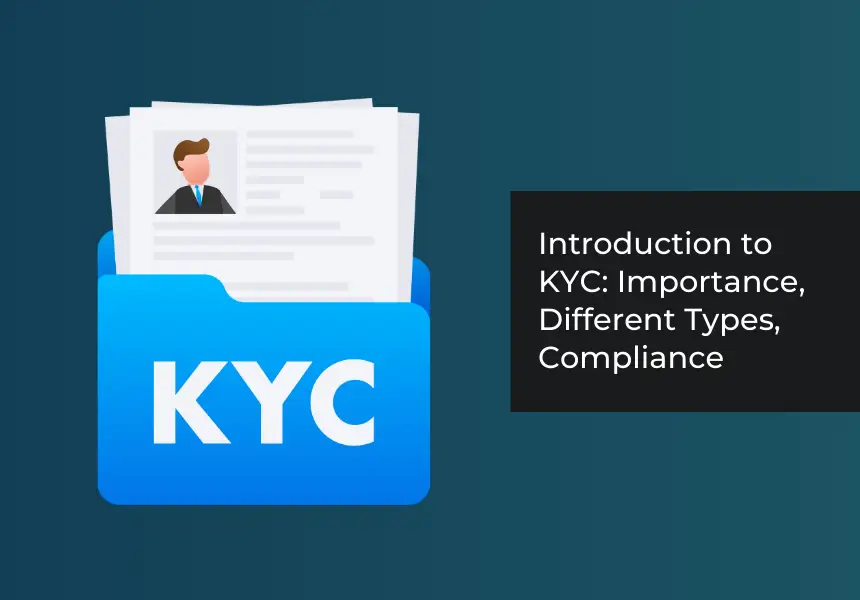
In today’s globalized financial world, “KYC” is a very important term. However, what exactly is KYC, and why is it important? The purpose of this article is to provide clarification on the meaning, importance, various forms, necessary paperwork, verification procedure, process in the banking industry, and significance of KYC compliance.
What does KYC mean and what does it stand for?
“Know Your Customer,” or KYC, is a crucial process in the financial industry. By confirming the identities of its clients, it reduces transactional risk. Financial organizations can efficiently maintain regulatory compliance by understanding their clients’ backgrounds.
Why is KYC Important?
For several reasons, KYC or Know Your Customer is necessary for lenders.
- KYC is essential in combating financial crimes such as fraud and money laundering. By verifying borrowers’ identities and scrutinizing their financial activities, businesses can detect and prevent illicit transactions, safeguarding their integrity and financial stability.
- KYC helps build trust between businesses and their customers. When companies verify customer identities and protect their information, it makes customers feel safer and more loyal. This leads to stronger relationships and more repeat business in the long run.
- KYC is essential for regulatory compliance. The RBI has mandated the lenders to carry out the KYC procedure.
- By understanding the nature of their customers’ activities and backgrounds, companies can make informed decisions about engaging in business relationships, thereby minimizing exposure to financial and reputational risks.
Who needs KYC?
Know Your Customer (KYC) protocols are essential for various entities, including financial institutions, businesses, and service providers.
Financial institutions, such as banks, NBFCs and investment firms, rely on KYC to verify the identities of their customers, ensuring compliance with anti-money laundering (AML) and counter-terrorism financing (CTF) regulations.
For businesses, especially those operating in regulated industries like gaming or pharmaceuticals, KYC helps in preventing fraud and maintaining integrity in transactions. Additionally, service providers offering online platforms or marketplaces require KYC to build trust, protect users’ data, and mitigate risks associated with illicit activities.
In essence, engaging in financial transactions or providing services that involve personal or financial information necessitates KYC procedures to foster security and trust.
Different Types of KYC
Aadhaar-based KYC
Aadhaar-based KYC uses India’s Aadhaar system, a biometric identification program. It allows businesses to verify the identity of customers electronically using their Aadhaar number and biometric data such as fingerprints or iris scans.
This type of KYC offers convenience and efficiency, as it eliminates the need for physical documents and reduces the time required for verification. It also enhances accuracy and security by leveraging biometric authentication, reducing the risk of identity theft or fraud.
In-Person KYC
In-person KYC, or physical KYC, involves verifying a customer’s identity through face-to-face interaction with a business or financial institution representative.
During this process, the customer is required to provide original documents such as a passport, driver’s license, or utility bills as proof of identity and address.
It can sometimes be time-consuming and cumbersome for both the customer and the business, especially when customers cannot provide valid documents or are located in remote areas.
Video KYC
Customers are on boarded via video call using vKYC. The procedure consists of two steps: the customer presents their documents during the video chat. It can save financial organizations’ expenditures by up to 90% and shorten the time it takes to onboard new customers from days to minutes.
Central KYC
The Central Registry of The Securing Asset Reconstruction and Security Interest of India (CERSAI) is responsible for managing and maintaining the Central KYC Registry, which is a centralized repository for KYC records.
With CKYC, users only need to complete the KYC check once, and following the check, they are given a unique KYC Identification Number (KIN). Improved accessibility benefits financial institutions, and consumers save time by not having to repeat the same information.
KYC in the Banking Sector
KYC is essential to developing and preserving customer relationships in the banking industry. In order to follow rules and stop financial crimes, banks need to have strict KYC procedures. Through KYC, banks can improve security, foster client trust, and reduce the risk of fraud and money laundering.
KYC Compliance
KYC compliance is an essential aspect of regulatory requirements across various industries, particularly in banking, finance, and other sectors dealing with financial transactions.
It involves thorough verification and documentation of customer identities, ensuring adherence to anti-money laundering (AML) and counter-terrorism financing (CTF) regulations. KYC compliance requires lenders to collect and verify personal information from their borrowers, such as identity documents, addresses, and financial details.
There are serious consequences for breaking KYC laws, such as large fines, harm to one’s reputation, and legal consequences. Therefore, lenders invest significant resources in implementing robust KYC compliance programs, including staff training, technology solutions, and regular audits.
By prioritizing KYC compliance, organizations fulfill their regulatory obligations and safeguard themselves against financial crimes, maintain customer trust, and uphold the economic system’s integrity.
Conclusion
To sum up, KYC is an essential component of preserving the security and integrity of the financial system, not only a legal requirement. Know Your Customer (KYC) protocols are integral to obtaining a personal loan.
Financial organizations may maintain trust and transparency in their operations and ensure regulatory compliance by having a thorough understanding of KYC, including what it means, its importance, types, and KYC compliance.
FAQs
How is KYC verification done?
Ans: Compliance officials may manually evaluate the KYC data or use automated technologies to verify it. It entails checking submitted documents for validity, determining the risk profile of the client, and keeping an eye on transactions for questionable activity.
Is KYC mandatory?
Ans: Yes, in order to comply with anti-money laundering (AML) and counter-terrorism financing (CTF) regulations, financial institutions and certain enterprises must conduct KYC. Financial fines and legal repercussions may follow non-compliance.
What is the KYC update?
Ans: The term “KYC update” describes the procedure of routinely checking and updating customer data to guarantee its relevance and correctness. Changes in risk profiles, legal requirements, or consumer information may need updates.
Can KYC be done online?
Ans: Yes, a lot of companies provide mobile applications or web platforms to complete the KYC process online. For the purpose of verification, customers can easily submit their documents and information online.
What are the consequences of breaking KYC regulations?
Ans: Businesses who violate KYC laws risk serious consequences, such as substantial penalties, legal obligations, harm to their reputation, and even loss of their operating license. It also puts companies at more risk of financial crimes, including fraud and money laundering.








